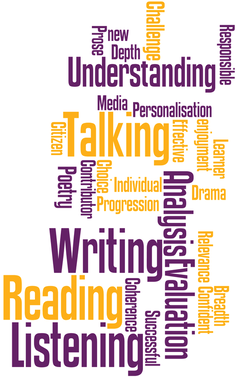English
English

English in the Senior Phase
In English you will develop and hone all aspects of literacy and communication specifically through the analysis and evaluation of literature, media and non-fiction prose.
English in the senior phase puts much emphasis on literature of increasing complexity and sophistication with a focus on comprehension, analysis and evaluation. Through this study there is opportunity to talk and write critically about literature. Additionally, there is also opportunity to develop the skills of writing both creatively and discursively. The third element of English is textual analysis of non-fiction prose – (RUAE – Reading for Understanding, Analysis and Evaluation)
At N4, N5 and Higher, candidates are expected to prepare and deliver a presentation as part of the Spoken Language Assessment.
Why Study English?
Being able to communicate effectively, both verbally and in written form, is relevant (and important) in all areas of life. Whether you work in hospitality or for the United Nations, there will be an expectation for you to communicate well in a variety of ways.
Studying literature in English also fosters a sense of empathy and understanding which really helps develop positive relationship with others and a greater appreciation of the world at large.
COURSES OFFERED IN THE SENIOR PHASE:
SQA: https://www.sqa.org.uk/sqa/45672.html
ENGLISH COURSES:https://www.myworldofwork.co.uk/search/sitewide/career%20profiles%20english
MEDIA / JOURNALISM:
https://www.gcu.ac.uk/gsbs/mediajournalism/
BENEFITS OF READING:
https://www.theguardian.com/books/booksblog/2013/oct/08/literary-fiction-improves-empathy-study
In English you will develop and hone all aspects of literacy and communication specifically through the analysis and evaluation of literature, media and non-fiction prose.
English in the senior phase puts much emphasis on literature of increasing complexity and sophistication with a focus on comprehension, analysis and evaluation. Through this study there is opportunity to talk and write critically about literature. Additionally, there is also opportunity to develop the skills of writing both creatively and discursively. The third element of English is textual analysis of non-fiction prose – (RUAE – Reading for Understanding, Analysis and Evaluation)
At N4, N5 and Higher, candidates are expected to prepare and deliver a presentation as part of the Spoken Language Assessment.
Why Study English?
Being able to communicate effectively, both verbally and in written form, is relevant (and important) in all areas of life. Whether you work in hospitality or for the United Nations, there will be an expectation for you to communicate well in a variety of ways.
Studying literature in English also fosters a sense of empathy and understanding which really helps develop positive relationship with others and a greater appreciation of the world at large.
COURSES OFFERED IN THE SENIOR PHASE:
- NATIONAL 4 & NATIONAL 5 ENGLISH
- COMMUNICATION 4 & LITERATURE 1
- HIGHER ENGLISH
- ADVANCED HIGHER ENGLISH
SQA: https://www.sqa.org.uk/sqa/45672.html
ENGLISH COURSES:https://www.myworldofwork.co.uk/search/sitewide/career%20profiles%20english
MEDIA / JOURNALISM:
https://www.gcu.ac.uk/gsbs/mediajournalism/
BENEFITS OF READING:
https://www.theguardian.com/books/booksblog/2013/oct/08/literary-fiction-improves-empathy-study
Watch the English Promo Video
Communication 4 and Literature 1 (S5 & S6 only)
Course Outline
This course comprises two units: Communication and Literature 1. Assessment is internal with no final examination.
The combination of Communication and Literature 1 is accepted by many institutions as an alternative to Higher English pass (grade C) for access to HND or degree level programmes. The expected standard, in terms of performance and assessment, takes this into account.
Many centres deliver the two units as a combined ‘English’ course, and this creates some opportunity for integrated assessment. Alongside Communication and Literature 1, candidates have the opportunity to bank Literacy Level 6.
Since the course content is demanding, both in terms of skills development and assessment, it is normally delivered over a full academic year.
Assessment
Candidates undertaking Communication with Literature 1 will be required to undertake 9 discreet assessments throughout the course of the year:
Assessment 1 —Respond in writing or orally to questions analysing and evaluating complex written non-fiction text
Assessment 2 —Respond in writing or orally to questions analysing and evaluating complex written non-fiction text
Assessment 3 —Produce evidence in the form of a literary essay
Assessment 4 —Produce evidence in the form of a complex non-fiction written text
Assessment 5 —Respond in writing or orally to questions analysing and evaluating complex spoken communication (single speaker, oral presentation)
Assessment 6 —Respond in writing or orally to questions analysing and evaluating complex spoken communication (two speakers and interviewer, varied stances)
Assessment 7 —Deliver an individual presentation which should last a minimum of five minutes, with additional time for questions (integrated with Literature 1, Outcome 1
Assessment 8 —Make a significant contribution to an in-depth group discussion
Assessment 9 —Textual analysis of an unseen literary text, in the form of restricted response answers to questions
Core Skills Development
Achievement of Communication NC gives automatic certification of the following at Level 6:
Course Outline
This course comprises two units: Communication and Literature 1. Assessment is internal with no final examination.
The combination of Communication and Literature 1 is accepted by many institutions as an alternative to Higher English pass (grade C) for access to HND or degree level programmes. The expected standard, in terms of performance and assessment, takes this into account.
Many centres deliver the two units as a combined ‘English’ course, and this creates some opportunity for integrated assessment. Alongside Communication and Literature 1, candidates have the opportunity to bank Literacy Level 6.
Since the course content is demanding, both in terms of skills development and assessment, it is normally delivered over a full academic year.
Assessment
Candidates undertaking Communication with Literature 1 will be required to undertake 9 discreet assessments throughout the course of the year:
Assessment 1 —Respond in writing or orally to questions analysing and evaluating complex written non-fiction text
Assessment 2 —Respond in writing or orally to questions analysing and evaluating complex written non-fiction text
Assessment 3 —Produce evidence in the form of a literary essay
Assessment 4 —Produce evidence in the form of a complex non-fiction written text
Assessment 5 —Respond in writing or orally to questions analysing and evaluating complex spoken communication (single speaker, oral presentation)
Assessment 6 —Respond in writing or orally to questions analysing and evaluating complex spoken communication (two speakers and interviewer, varied stances)
Assessment 7 —Deliver an individual presentation which should last a minimum of five minutes, with additional time for questions (integrated with Literature 1, Outcome 1
Assessment 8 —Make a significant contribution to an in-depth group discussion
Assessment 9 —Textual analysis of an unseen literary text, in the form of restricted response answers to questions
Core Skills Development
Achievement of Communication NC gives automatic certification of the following at Level 6:
- Communication Core Skill
- Critical Thinking
- Core Skills
- Critical Thinking











